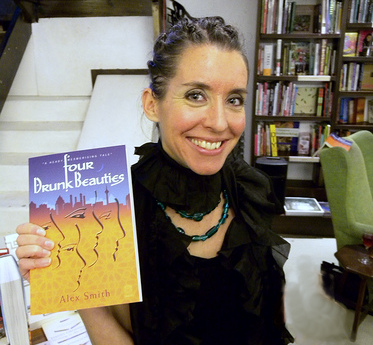ALEX SMITH provides some tips for creating a writing routine you will actually stick to.
So, you have a great idea for a novel? Or a series? Or a memoir? Perhaps a place, an experience or a character has you feeling inspired to write, or you really want to enter a short story competition.
Grand!
Why, then, are you reading this and not writing? Why do you need to be told how to get to your desk (or maybe you have a Roald Dahl-inspired writing hut) and make your dream come true?
I’m sure you have a suitcase of excuses in answer to that. But really, if you want to write, all you need to do is sit down and write. Sounds easy. And yet it is often astonishingly hard to do. Believe me, I know how much filing, laundry and WhatsApping can suddenly fill a perfectly good hour that I could have spent on writing. I, too, have a duffel bag of excuses to justify my lack of writing.
But let’s not be too harsh on ourselves. Having inspiration is a good thing, isn’t it? It’s a necessary first step, right? The Big Idea? Ta-dah!
No.
Jack London famously said, ‘You can’t wait for inspiration. You have to go after it with a club.’
The problem with the Big Idea is that it’s a misleading first step. You should never start writing just because you have a good idea. You should be writing already, constantly on the prowl, hunting down stories, putting in the hours, having fun with words.
Learn to grapple with frustrating sentences that resist perfection, get used to not feeling like writing, make peace with the misery of a story that starts well but fizzles out – and regardless of the struggle, write anyway. If you have to wait for inspiration, you’ll be lucky to write one story in a lifetime.
‘What?’ I can hear you muttering, ‘She must be crazy.’
Well, writing is crazy. Crazy and wonderful and sometimes miserable. It will drive you to your limits, including your limits of self-belief. If you’re reading this and hoping for a cure-all schedule that will solve your tendency to procrastinate, if you’re reading this and not writing, then you may well be suffering from self-doubt (which for writers could also be called pernicious optimism or toxic expectations.
Everyone is shouting at once now: ‘It’s not doubt it’s TIME, you crazy woman. I just don’t have time!’
Sure, you work, you’ve got children, you’re too tired, you feel lazy and you need to watch Netflix. Besides, you’ve got a social life to maintain. And, as if that weren’t enough, you’re also studying, looking after sick relatives, travelling the world, and you’ve become president. You’re saving the universe … and you don’t have TIME.
If you did, you would, of course, be writing. Well, for every drain on your time that you can mention, I bet Google can find a famous author who had the same time drain but managed to fit in writing anyway.
Most writers who get published, and many who become famous, do their first years of writing while they still have a day job (and probably a family and a bit of a social life, along with some housework and sleep when needed). After they’re famous, they probably quit that other job and have the luxury of making a living out of writing. But even then, they can’t wait for inspiration; they have to go after it with a bazooka.
Publishers are not charity organisations – just because they’ve published you once doesn’t mean you can rest on your laurels. If you want to write for a living, you must keep writing, and you’re going to face doubts all the time. Hemingway said, ‘There is nothing to writing. All you do is sit down at a typewriter and bleed.’ I’d say he was well-versed in the tribulations of getting a story onto the page and certainly didn’t suffer from pernicious optimism.
After 14 years of working with dozens of debut novelists, I can say without hesitation that those who give up do so not because of time but because of doubt, a feeling of failure before even starting. Doubt can make you lazy, exhausted; it eats time. But the first step towards clubbing that pesky doubt is acknowledging that it is not time you lack but confidence.
I can hear you now smugly saying, ‘I know I can write. I’m a good writer. People have told me this.’
Don’t lie to yourself: if you’re not writing, you’re doubting. And if you’re doubting, you’ve likely burdened yourself with huge expectations, leading to creative impotence.
Confidence is married to expectations. Maybe you’ve had some work published and won some writing competitions. But doubt is keeping you from writing more. This kind of doubt is not always about skill but about repeating success or avoiding disappointment.
Big ideas quickly turn bad after a few doses of self-doubt. But bad ideas can just as easily transform into beautiful ones when you’re turning up regularly to write.
Really, all you need to know about keeping to a schedule is that as long as you can fit in an hour or two of writing, three to five times a week, you’ll get your novel, story or memoir written. Lower your expectations and work harder. In other words, arrive at your writing desk like a Stoic (more on that later).
Now I’m bringing out my bazooka: Alain de Botton, my favourite philosopher, who says, ‘If you expect to succeed, you will almost certainly fail.’ (You can join the millions of other viewers and watch his talk on the wisdom and power of pessimism on YouTube.)
I would like to extend de Botton’s notions on life to writing and offer that it is useful to think of writing as ‘a deeply troubled and compromised affair’. He suggests starting a project with a sense of gentle pessimism, assuming the outcome won’t be great.
OMG, what a relief: you mean my first draft doesn’t have to win the Man Booker Prize? This sounds absurd, doesn’t it? But, after more than a decade of teaching creative writing, I cannot tell you how many very erudite and intelligent people punish themselves with outlandish optimism regarding the quality of their first draft (and, usually, it is the first draft of the first novel they have ever attempted to write).
And then there are the slews of writers who get published but believe that their book is going to be an instant bestseller – sheesh, the pressure! Toxic expectations. De Botton says it perfectly: ‘A society that tells people that they can achieve anything will also be a society that very swiftly develops a problem with self-esteem. If everybody expects to achieve everything, you’re going to get an awful lot of people who are feeling that something’s gone dramatically wrong with their lives.’
Or their manuscripts. Or their debut novels (which are published but, guess what, are not bestsellers!) If you, as a writer, begin each project thinking it’s the next Harry Potter or whatever manner of literary glory floats your boat, you are sabotaging your project and your creativity with pernicious optimism and toxic expectations. And this is an oily sludge that makes sticking to a schedule almost impossible. No matter how well-researched and carefully planned that schedule may be.
Earlier, I mentioned arriving at your writing desk like a Stoic. If you watch de Botton’s talk on pessimism, you will hear him mention Seneca’s Praemeditatio Malorum (the premeditation of evils): ‘The wise will start each day with the thought, “Fortune gives us nothing which we can really own.”’
This is a Stoic daily practice to prepare for setbacks and develop resilience. It acknowledges that not everything goes smoothly despite your best efforts and hard work.
I suggest you start each writing session with an amended meditation for Stoic Writers (the ones who keep writing through the doubt):
As you sit down at your writing desk, imagine everything that could go wrong. Like Marcus Aurelius (another famous Stoic), acknowledge as you write that ‘today I will be meeting with interference’. And when your manuscript is edited and completed, acknowledge that the publishing process will also prove that the destinies of writers ‘are in a whirl’. Nothing is stable. Nothing is sure. An empire can be overthrown in an hour. ‘Reckon on everything, expect everything.’
You’ve been very patient, and I did promise some more SEO-friendly blog posts on the scheduling dilemma. Here they are:
8 Ways to Create (And Stick To) A Writing Schedule
How to Start a Writing Schedule You’ll Actually Stick To
How to Achieve Your Writing Goals
To prove it is possible to bazooka the doubt, when I write the last full stop here, I am going to start work on a new novel. I am also throwing down the gauntlet. I challenge you to start a brand-new project or recommit to an old one; and renew your vows to a fresh writing schedule.
Give toxic expectations the middle finger, embrace gentle pessimism and start writing now!
Good Luck.
About the Author

Alex Smith is the author of two magic real novels Algeria’s Way and Four Drunk Beauties, two YA fantasy novels, Agency Blue and Devilskein & Dearlove, a memoir, Drinking from the Dragon’s Well, about teaching English in Wuhan, China, and a series of middle-grade novels translated into African languages and prescribed as set works in South African schools.
Her short stories have been published in journals and anthologies in the UK, South Africa, Ireland, Germany and Sweden. She has won the Nielsen Booksellers Choice Award and the Sanlam Youth Literature Award. Alex was shortlisted for The Caine Prize for African Writing, was a finalist in the NLDTF/PANSA Festival of Contemporary Theatre Readings and, on the recommendation of author Andre Brink, was a candidate in the Rolex Mentor & Protégé Arts Initiative.
Alex tutors the Novel Writing Course, the Literary Short and Flash Fiction Course, and the Memoir Course at the Writers College.











